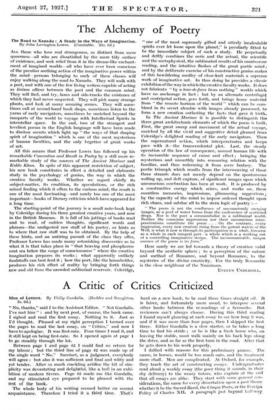The Alchemy of Poetry The Road to Xanadu : A
Study in the Ways of imagination.
By John Lavington Lowes. (Constable. 31s. Gd.)
ALL those who love real strangeness, as distinct from mere queernessŌĆöall who are dissatisfied by the mere tidy surface Of existence, and seek relief from it in the dream-like enchant- ment of imagined worldsŌĆöall who have ever been conscious of the peculiar seething action of the imaginative power within the mindŌĆöpersons belonging to each of these classes will enjoy walking along the road to Xanadu. They will walk with a poet, and with one of the few living writers capable of acting as liaison officer between the poet and the common mind. They will find, and try, lanes and side-tracks the existence of which they had never suspected. They will pick many strange plants, and look at many amazing scenes. They will some- times call at second-hand book shops, sometimes listen to the yarns of early navigators, sometimes be snatched beyond the ramparts of the world to voyage with Intellectual Spirits in interstellar space. In the end, two of the strangest and loveliest, poems in the English language will have been made to disclose secrets which light up " the ways of that shaping spirit of imagination " which is one of the most mysterious of human faculties, and the only begetter of great works of art.
All this means that Professor Lowes has followed up his remarkable Convention and Revolt in Poetry by a still more re- markable study of the sources of The Ancient Mariner and Kubla Khan. In spite of this apparent restriction of subject, his new book constitutes in effect a detailed and elaborate study in the psychology of genius, the way in which the creative faculty works. Whether we regard chiefly its subject-matter, its erudition, its speculations, or the rich mixed feeding which it offers to the curious mind, the result is one of the most fascinatingŌĆöand surely too one of the most importantŌĆöbooks of literary criticism which have appeared for a, long time.. .
The starting-point of the journey is a small note-book kept by Coleridge during his three greatest creative years, and now in the British Museum. It is full of his jottings of books read and to read, of sudden thoughts, significant words and phrasesŌĆöthe undigested raw stuff of his poetry, or hints as to where that raw stuff was to be obtained. By the help of these hints, and an untiring pursuit of the clues they offer, Professor Lowes has made many astonishing discoveries as to what it is that takes place in. " that heaving and phosphores- cent sea below the verge of consciousness " where the creative imagination prepares its works ; what apparently unlikely foodstuffs can best feed it ; how the poet, like the householder, produces his rich effect of reality by bringing forth things new and old from the crowded subliminal reservoir. Coleridge, " one of the most supremely gifted and utterly incalculable spirits ever let loose upon the planet," is peculiarly fitted to
be the immediate subject of such a study. Ile perpetually and deftly combines the eerie and the actual, the scientific and the metaphysical, the sublimated results of his omnivorous reading, and the intuitive flashes of the great poetic mind ; and by the deliberate exercise of his constructive genius makes of this bewildering medley of close-knit materials a supreme work of imaginative art. In thus doing he provides a classic exhibition of the way in which the creative faculty works. It does not fabricate " by a tour-de-force from nothing" worlds which have no anchorage in fact ; but by an alternate centrifugal
and centripetal action, goes forth, and brings home material from " the remote horizon of the world " which can be com- bined in its secret alembic with images already possessed, to form a new creation outlasting the facts that gave it birth.
In The Ancient Mariner it is possible to distinguish the three great architectonic elements of which the poem is built. First, the great sweep and movement of the actual voyage, enriched by all the vivid and suggestive detail gleaned front Coleridge's delighted reading of the early navigators. Then the supernatural action, which interpenetrates and keeps pace with itŌĆöthe transcendental plot. Last, the steady operation of the law of consequence, normal human life with its inexorable sequence of cause and effect ; bringing the mysterious and unearthly into reassuring relation with the familiar, and thus redeeming it from mere fantasy. The poetic triumph which results from the interweaving of these three strands does not merely depend on the spontaneous welling up, and deft capture, of significant images upon which unconscious cerebration has been at work. It is produced by a constructive energy which seizes, and works on, these countless memories, impressions, glimmering suggestions by the capacity of the mind to impose ordered thought upon rich chaos, and subdue all to the stern logic of poetry :ŌĆö " The poem is not the confluence of unconsciously inerging images, as a pool of water forms from the coalescence of scattered drops. Nor is the poet a somnambulist in a subliminal world: Neither the conscious impressions nor their unconscious inter- penetrations constitute the poem . . . On the contrary, every impression, every new creature rising from the potent waters of the Well, is what it now is through its participation in a whole, foreseen as a whole in each integral partŌĆöa whole which is a working out of a controlling imaginative design. The incommunicable, unique essence of the poem is its form.'
Ilere surely we are led towards a theory of creation valid beyond the aesthetic sphere ; to a perception of the nature and method of Romance, and beyond Romance, to the mysteries of the divine creativity. For the truly Romantic is the close neighbour of the Numinous.
EVELYN UNDERHILL.


































 Previous page
Previous page